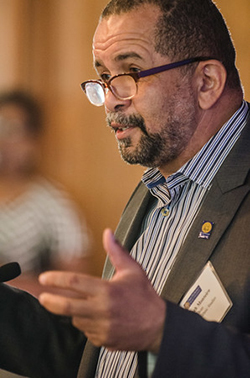Visiting Professor in Social Justice created in College of Ethnic Studies
SAN FRANCISCO, Oct. 31, 2014 -- The establishment of the Robert A. Corrigan Visiting Professor in Social Justice in the College of Ethnic Studies at San Francisco State University, funded by a gift from longtime University supporters George and Judy Marcus, was announced on Oct. 26. The position is named for former SF State President Robert A. Corrigan, who was lauded for his commitment to social justice and diversity during his 24-year tenure.

The new visiting professor position was announced by Kenneth Monteiro, dean of the College of Ethnic Studies, at the college's 45th anniversary celebration on Oct. 26.
"The establishment of the Corrigan Visiting Professor in Social Justice signals the University's continued commitment to civic engagement and social justice," said President Les Wong. "Robert Corrigan has been an important champion of those values, and naming the position in his honor is a fitting way to recognize the legacy of his time at SF State."
The Corrigan Visiting Professor in Social Justice will be a scholar who is "engaged in cutting-edge academic, educational and community initiatives that promote social justice and advance the aspirations of people of African American ancestry," said Kenneth Monteiro, dean of the College of Ethnic Studies.
With the creation of this position, visiting professors will be assigned to the College of Ethnic Studies for terms of six months to one year. The professor will teach a class and participate in other activities, including delivering a formal lecture. "This position will enrich the intellectual and research initiatives of the College of Ethnic Studies and the University as a whole by advancing the theoretical framework and practice of social justice," Monteiro commented.
Monteiro added that a successful candidate for the role will have an area of scholarship or creative endeavor that complements the work of current SF State faculty and also has important constructive implications for the University's constituent communities.
George (B.A., '65) and Judy Marcus (B.A., '62), who met while studying at SF State, have previously funded the International Center for the Arts and provided significant support to the Center for Modern Greek Studies, the Department of Cinema, student scholarships and other SF State programs. George Marcus is the founder and chairman of Marcus & Millichap, a real estate brokerage firm based in Palo Alto.
The position pays tribute to Corrigan's legacy of advancing diversity in higher education. Corrigan established one of the nation's first black studies programs at the University of Iowa in the 1960s. As SF State president for nearly a quarter of a century until his 2012 retirement, Corrigan was recognized for his efforts to build a more diverse campus community. Approximately half of the tenure-track faculty hired during his administration were female, and almost half were minorities. A San Francisco Chronicle profile published on the occasion of his retirement was fittingly titled "Robert Corrigan: The man who diversified SFSU."
When speaking at the commencement prior to Corrigan's retirement, San Francisco Mayor Ed Lee told him, "You are a true champion of change. You have taught us that social justice and diversity are values which we as leaders need to live by."
The announcement about the visiting professor position was made at the College of Ethnic Studies' 45th anniversary celebration. The college, established in 1969, is the country's only multi-ethnic, multidisciplinary college of ethnic studies, offering four bachelor's and two master's degrees and serving about 6,000 students in 150 courses each year.
###
SF State is the only master's-level public university serving the counties of San Francisco, San Mateo and Marin. The University enrolls nearly 30,000 students each year and offers nationally acclaimed programs in a range of fields -- from creative writing, cinema, biology and history to broadcast and electronic communication arts, theatre arts and ethnic studies. The University's more than 228,000 graduates have contributed to the economic, cultural and civic fabric of San Francisco and beyond.